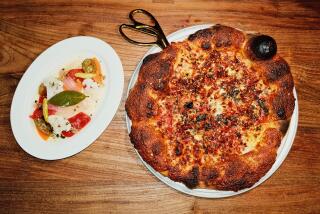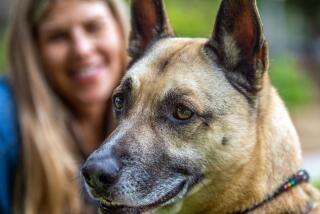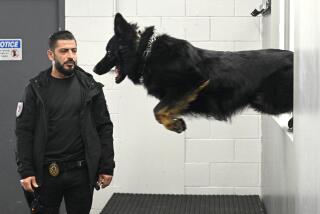Which puppy will be a good guide dog? Ask mom!

The roughly 32% of puppies who washed out of “seeing-eye” dog school got the most attention from their mothers. (August 8, 2017) (Sign up for our free video newsletter here http://bit.ly/2n6VKPR)
- Share via
Between all the suckling, snoozing, romping and tumbling they do, how can you look at a litter of puppies and pick out the ones who have what it takes to be a successful guide dog?
A new study suggests one of the first tip-offs may come from the kind of attention that mom gives her puppies in their first three weeks of life.
In a group of 98 puppies (39 German shepherds, 44 Labrador retrievers and 15 golden retrievers) who were bred to become guide dogs for people with visual disabilities, it wasn’t the pups who got the most licks and milk on demand that were most likely to succeed.
It was the ones who didn’t.
Strongly represented in the roughly 32% of puppies who washed out of “seeing-eye” dog training school were those who, in their first three weeks of life, spent lots of time nursing while their mom lay on her side, and who got lots of extra licking from mom.
Among the 66 puppies who, at age 2 1/2, graduated from guide dog training school, researchers noted a clear trend: Many were puppies who at various points had to scramble for a chance to nurse while their mom was sitting, standing or marching away.
The authors of the new research, from University of Pennsylvania’s departments of psychology, biostatistics, biology and veterinary medicine, surmise that, in a group of puppies who are roughly equally endowed with the intelligence to succeed at guide dog school, the ones who have the best chance of success are those who had attentive moms, but who nevertheless endured just a little bit of stress as babies.
Their report was published Monday online in the journal PNAS.
“Vertical nursing” — suckling while mom is upright and not wholly open for business — is challenging, and, as a result, not very common. Getting a bit of nourishment that way involves finding a nipple that’s either hidden away or on the move, and keeping up.
Puppies who succeed at it are either blessed with special levels of perseverance, ingenuity and problem-solving, or they develop it (and are rewarded for their troubles with a drink of milk) when mom meets most of their needs, but makes them work just a bit harder once in a while.
Either way, by the time they’re young adults, at 14 to 16 months, these mobile nursers have an edge that allows more of them to succeed. As these gently-stressed babies grow into their own, they display better abilities to navigate around obstacles, to cope with unfamiliar settings and objects, and to suppress their instinctual responses than do dogs who commanded the lion’s share of mom’s milk and attention.
The tasks in young adulthood that best predicted success in guide dog school drew upon these qualities. By the time these dogs reached 2 1/2, those differences were pretty good predictors of whether they had what it takes to complete a guide dog’s rigorous training.
The researchers put the young dogs through a battery of 11 behavioral tasks in a bid to identify which best predicted success in guide dog school. They found that dogs who would graduate were far more likely than washouts to crack a multistep problem-solving test that involved gaining access to a treat. And those who held off barking or whining longest when confronted with a battery-operated toy cat were also more likely to succeed than those who quickly protested when left in a room with a pair of these diabolical creatures.
A third task yielded predictions of success that differed according to breed. The test involved the experimenter standing in front of the young adult dog with a black fold-up umbrella and, out of the blue, pressing the button that causes it to shoot outward and unfurl.
Labrador retrievers that responded to the umbrella-opening exercise with higher levels of surprise and fear were less likely to complete guide dog school successfully. But for golden retrievers, the opposite was true: Those who responded to the unexpected umbrella deployment with greater surprise and subsequently wariness were more likely to succeed in guide dog school.
“In sum, what predicts a successful guide dog?” the researchers ask. “Our results support previous studies on other animals in reaffirming the enduring benefits of maternal care — in moderation.” Quite possibly, everything else flows from those little moments of adversity that puppies (or rat, squirrel, monkey and human babies) experience when mom throws a little challenge their way.
Twitter: @LATMelissaHealy
ALSO:
Scientists tally the environmental impact of feeding meat to our cats and dogs. It’s huge
Here’s where experts say we should draw the line on gene-editing experiments on human embryos
In a first, scientists rid human embryos of a potentially fatal gene mutation by editing their DNA







